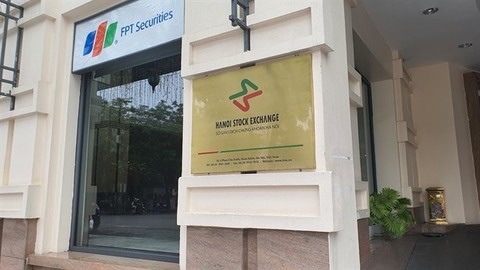|
Foreign outflows amid lack of new draws for Việt Nam
The domestic stock market has witnessed a notable withdrawal of foreign capital as investors cannot see many new compelling factors in Việt Nam compared to the past, or relative to other investment destinations, said insiders.

Outside the headquarters of the Hà Nội Stock Exchange (HNX) in Hà Nội. — VNS Photo Ly Ly Cao
|
Foreign investment funds and foreign investors are an important component of the institutional investor base in the Vietnamese stock market. However, this group has been consistently net selling since 2023.
So far this year, foreign investors have net sold around US$2 billion and if we look at the period starting from 2023, the total net selling by this group amounts to approximately $4 billion.
At a conference themed 'Upgrading, Raising Capital and Developing Institutional Investors' on Friday, Nguyễn Quang Thuân, Chairman of FiinGroup, revealed the three main reasons cited by foreign investors who are partners of the company.
He said that foreign investors were reallocating assets they had in emerging markets, as they were disappointed that the US Federal Reserve's interest rate reductions had been slower than the previous rapid hikes.
Another reason was that they were taking profits, as the foreign exchange risk in Việt Nam was high and they fear potential losses after making substantial gains of several tens of percent.
Meanwhile, they had concerns about the unique characteristics of the Vietnamese stock market, as well as the outlook for the real estate sector and foreign exchange rates.
Dominic Scriven, Chairman of Dragon Capital, noted that foreign investors had been net sellers of Vietnamese stocks, offloading $4 billion over the past four years, including $2 billion just this year.
Previously, foreign investors were familiar with Việt Nam mainly as a tourism and business destination, focused on Hà Nội and HCM City. However, they now feel the country lacks the new and exciting factors to sustain their interest, while other markets offer more appealing investment opportunities.
A key objective factor was the impact of the Fed rate hikes over the past two years, which had significantly influenced global investor sentiment and strategies centred around equity investing. In this context, frontier markets like Việt Nam had underperformed, a dynamic beyond the country's control.
Crucially, the fact that Việt Nam had yet to gain emerging market status also weighed on foreign investors' perceptions.
Over the past one or two years, there had been some developments that impacted risk perceptions and it was hoped this influence would subside going forward, the leader of Dragon Capital said.
At the event, State Capital Investment Corporation (SCIC)'s Deputy General Director, Lê Thanh Tuấn provided details on their plans to divest from major state-owned enterprises. The goal was to increase the supply of quality stocks and attract more institutional investor participation in the equity market.
However, Tuấn noted that while domestic and foreign investors wanted to buy these shares and the state wanted to sell them to boost supply, the divestment and equitisation processes were not successfully drawing in institutional investors.
He explained that this was because the required procedures, like the auction process and information disclosure rules, were not appealing to many institutions. The complex requirements act as barriers that discourage wider institutional investor involvement in acquiring the state-owned stakes.
"Many foreign investors want to participate in SCIC's divestment deals, but the current auction process doesn't align with procedures typical in foreign markets, which is a major obstacle discouraging institutional investor participation," Tuấn said.
According to FiinGroup data, foreign investors currently own around 14 per cent of the Vietnamese stock market. This includes 17.3 per cent on the Hồ Chí Minh Stock Exchange (HoSE), 5.4 per cent on the Hà Nội Stock Exchange (HNX) and 3 per cent on UPCoM.
At the end of 2023, the foreign ownership ratios were 19.83 per cent, 10.99 per cent and 4.24 per cent, respectively.
While stock attractiveness in terms of size, quality and liquidity is important, the relatively low free-float of around 45.5 per cent in the Vietnamese market means there is significant potential to attract more domestic and foreign institutional investors as the state divestment process continues.
Bizhub
|